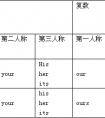句型转换。1. The boy is on the city basketball team.(改为同义句) The boy is _______ _______ _______the city basketball team.2. He would like to play basketba-八年级英语
To whom did you speak on the campus?
你在校园里和谁讲话了?(作介词宾语,置介词 后,不能用who取代。)
三、疑问代词用于对介词宾语提问时,过去的文体中介词和疑问代词通常一起放在句首,现代英语中,疑问代词在句首,介词在句未,例如:
For what do most people live and work?大部分人生活和工作的目的是什么?(旧文体)
What are you looking for?你在找什么?(现代英语)
四、疑问代词还可引导名词性从句,例如:
I can't make out what he is driving at.
我不知道他用意何在。
Can you tell me whose is the blue shirt on the bed?
你能告诉我床上的蓝衬衣是谁的吗?
Much of what you say I agree with, but I cannot go all the way with you.
你说的我大部分同意,但并不完全赞同。
1. 疑问代词有who, whom, whose, which和what, 都是用来构成疑问句的:
Who is calling? 谁打电话来?
Whom do you want to speak to? 你想找谁接电话?
作主语时用who,作宾语时用whom,在口语中用who作宾语时也不少:
Who did you mean? 你指的是谁?
Who are you talking about? 你们在讲谁?
直接跟在介词后时只能用whom:
With whom did you come? 你和谁一道来的?
(口语中说“Who did you come with?时更多一些。)
2. 其他三个疑问代词可用作:
1)主语:
What’s your address? 你的地址怎样写?
Whose is better? 谁的好一些?
Which of these is yours? 哪一本是你的?
2)宾语:
What do you mean? 你是什么意思?
Which do you like better? 哪一个你更喜欢一些?
Whose have you chosen? 你选了谁的?
3)表语:
What’s her name? 她叫什么名字?
Whose is it? 这是谁的?
4)定语(这样用时有些字典标作形容词):
What time does the train leave? 这列火车什么时候离开?
Which room shall we stay in? 我们住哪间房?
Whose passport is this? 这是谁的护照?
考点名称:疑问副词
- 疑问副词:
用来引导特殊疑问句,表示时间,地点,方式,原因等。
常见的有:when,where,how,why等。 疑问副词的用法:
1.疑问副词是问何时、何地、如何、因何的副词,主要有when, where, how, why。
2.疑问副词用在句首。
How long have you been staying in America?
你在美国待多久了?3.疑问副词在句中引导名词子句。
I want to know where she has gone.
我想知道她去哪里了。4.疑问副词后接不定词构成的名词片语,在句中可以作主词、受词或主词补语。
How to solve the problem gives him a bad headache.
如何解决这个问题使他伤透脑筋。
(How to solve the problem作主词。)
I don't know how to answer the question.
我不知道如何回答这个问题。
(how to answer the question作受词。)
The patient is in urgent need the medicine, but the problem is where to get it.
这个病人急需这种药,但问题是哪里能找到。
(where to get it作主词补语。)5.疑问副词引导的名词子句可作主词、受词或主词补语。
When we are to start the competition hasn't fixed yet.
我们什么时候开始比赛还没有定下来。
(When we are to start the competition作主词。)
She asked her husband where he had been.
她问她丈夫去哪里了。
(where he had been 作受词。)
The question is when we can finish our work.
问题是我们何时能完成我们的工作。
(when we can finish our work作主词补语。)- 疑问代词与疑问副词的区别:
1. 疑问代词做对陈述句的主语,宾语或定语提问,即做句子的主语,宾语或定语,如what, who/ whom, whose.
eg. Who is talking ? What can you see?
Whose shirt is this?
2.疑问副词对时间,地点,方式等状语提问,如when, where, how 等.
eg. When is your birthday? Where are you going?
How do you know?
常见的疑问代词:what who which whom(只做宾语)
疑问副词:how where when
还有whether是疑问连接词。
考点名称:介词
- 介词:
是一种用来表示词与词、词与句之间的关系的虚词,在句中不能单独作句子成分。
介词后面一般有名词代词或相当于名词的其他词类,短语或从句作它的宾语。 - 介词的分类:
(1)表示时间,处所:从 自 自从 于 打 到 往 在 当 朝 向 顺着 沿着 随着
(2)表示方式:按 照 按照 依 依照 本着 经过 通过 根据 以 凭
(3)表示目的:为 为了 为着
(4)表示原因:因 由于 因为
(5)表示对象,范围:对 对于 把 向 跟 与 同 给 关于
(6)表示排除:除 除了 除去 除非
(7)表示被动:被 叫 让 给
(8)表示比较:比 和 同
上述介词中的“着,了,过”是语素,不是动态助词。 介词at, in, on的区别:
1. 表示时间,注意以下用法:
(1) 表示时间的某一点、某一时刻或年龄等用 at。如:
I get up at six in the morning. 我早上六点钟起床。
He got married at the age of 25. 他 25 岁结婚。
(2) 泛指一般意义的上午、下午或晚上以及月或年等较长的时间,一般用 in。如:
We watch TV in the evening. 我们晚上看电视。
He went to Japan in 1946. 他于 1946 去了日本。
(3) 若表示星期几或某一特定的日期,则用 on。如:
He left here on the fifth of May. 他于 5 月 5 日离开这儿。
2. 表示地点、场所、位置等,注意以下用法:
(1) 表示某一点位置,用 at。如:
We live at No 87 Beijing Road. 我们住在北京路 87 号。
The hospital is at the end of the street. 医院在这条街的尽头。
与名词所有格连用表示地点,也用 at。如:
at my sister’s 在我姐姐家 at the doctor’s 在医务室
(2) 表示空间或范围,用 in。如:
What’s in the box? 这盒子里有什么?
He lives in Paris with his wife. 他同他妻子住在巴黎。
但有时两者可换用。如:
The meeting was held at [in] the hotel. 会议在宾馆举行。
(3) at 与 in 的另一个区别是:at 用于指较小的地方,而 in 用于指较大的地方。如:
in Shanghai 在上海 at the station 在车站
但是,大与小是相对的,有时随着说话者的着眼点不同,大地方也可能用 at(比如把一个大地方看作一个点时)。如:
Our plane refuelled at London. 我们的飞机在伦敦加油。
We stopped for an hour at Moscow on our way to Paris. 我们在去巴黎的途中在莫斯科停了 1 个小时。
(4) 介词 on 用于地点,主要指在某物的表面。如:
What’s on the table? 桌上有什么?
There’s a wallet lying on the ground. 地上有个钱包。
注:在少数搭配中,也用介词 on。如:
He works on a farm. 他在农场工作。
3. 在某些搭配中,三者的区别与英国英语和美国英语有关:
in the street (英) / on the street (美) 在街上
in the road (英) / on the road (美) 在路上
in the team (英) / on the team (美) 在这个队
at the weekend (英) / on the weekend (美) 在周末
at weekends (英) / on weekends (美) 在周末
4. 有时三者的差别与搭配习惯和用法有关:
in bed / on the bed 在床上
in the tree (多指树外之物) / on the tree (多指树本身之物) 在树上介词besides,but,except的用法区别:
1. 三者都可表示“除外”,但 besides 表示一种累加关系,意指“除了什么之外,还有……”;
而 except 或 but 则表示一种排除关系,意指“除了什么之外,不再有……”。如:
Besides his wife,his daughter also went to see him. 除他妻子外,他女儿也去看过他(即妻子女儿都去看过他)。
Nobody went to see him except [but] his wife. 除他妻子外,没有一个人看过他(即只有他妻子去看过他)。
注:在否定句中,besides 也表示“除……之外不再有…… ”,与but, except 同义。如:
No one passed the exam besides [except] Jim. 除吉姆外,没一个人通过考试。
2. 关于 but 与 except:
(1) 两者都可表示“除……外不再有……”,但含义上略有差别:
but侧重指意义的几乎完整性,而 except 则侧重指后面除去的部分。比较:
All are here but one. 除一个人都到了。
All are here except one. 还有一个人没到。
(2) 在现代英语中,but 的介词用法十分有限,一般说来,它只能用在下列词语之后:
① no, no one, nobody, nothing, nowhere 等
② any, anyone, anybody, anything, anywhere 等
③ every, everyone, everybody, everything, everywhere 等
④ all, none 等
⑤ who, what, where 等
Everyone knows it but you. 除你之外大家都知道。
- 最新内容
- 相关内容
- 网友推荐
- 图文推荐
| [家长教育] 孩子为什么会和父母感情疏离? (2019-07-14) |
| [教师分享] 给远方姐姐的一封信 (2018-11-07) |
| [教师分享] 伸缩门 (2018-11-07) |
| [教师分享] 回家乡 (2018-11-07) |
| [教师分享] 是风味也是人间 (2018-11-07) |
| [教师分享] 一句格言的启示 (2018-11-07) |
| [教师分享] 无规矩不成方圆 (2018-11-07) |
| [教师分享] 第十届全国教育名家论坛有感(二) (2018-11-07) |
| [教师分享] 贪玩的小狗 (2018-11-07) |
| [教师分享] 未命名文章 (2018-11-07) |

![— Do you know Meimei? — Yes, she is from a university and she is _____ honest girl. [ ]A. a B. an C. / -九年级英语](http://www.00-edu.com/d/file/ks/4/2/budingguanciaan/2019-11-29/small4247048cc84563d0252c1b027b2033211574983264.png)
![—Did that sportsman win ____ gold medal at ____Athens Olympics?—Yes, he did.[ ]A. a; an B. a; theC. a; / D. /; the-九年级英语](http://www.00-edu.com/d/file/ks/4/2/budingguanciaan/2019-11-29/small06f379c6a3c3ac9bb311d3a899491d161574984708.png)
![We don’t think she is ____ honest girl. [ ]A. a B. an C. the D. /-八年级英语](http://www.00-edu.com/d/file/ks/4/2/budingguanciaan/2019-11-29/small71b0b51d70c69d2813b4c24ce33ea1331574983883.png)
![— Do you have _____ MP3? — NO, I don't.[ ]A. a B. an C. the -九年级英语](http://www.00-edu.com/d/file/ks/4/2/budingguanciaan/2019-11-29/smallb4936ea5ddac8c680b9d3e87837821eb1574983324.jpg)

